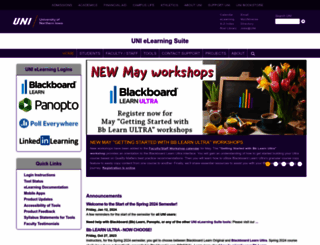UNI eLearning Suite
Page Load Speed
1.3 sec in total
First Response
120 ms
Resources Loaded
986 ms
Page Rendered
191 ms

About Website
Click here to check amazing ELearning UNI content for United States. Otherwise, check out these important facts you probably never knew about elearning.uni.edu
Visit elearning.uni.eduKey Findings
We analyzed Elearning.uni.edu page load time and found that the first response time was 120 ms and then it took 1.2 sec to load all DOM resources and completely render a web page. This is quite a good result, as only 20% of websites can load faster.